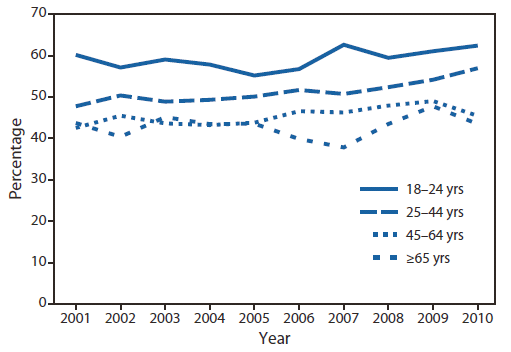Although 68.8% of American adults want to give up smoking, very few manage to do so successfully, according to a new report published by Morbidity and Mortality Weekly Report (MMWR), a part of the CDC (Centers for Disease Control and prevention). The authors found that 52.4% of regular smokers had tried to quit at some time during the previous 12 months – only 31.7% attempted to do so with either counseling or medication.
The number of times people tried to give up smoking during 2001-2010 rose among smokers aged between 25 and 64 years, but fell among older individuals. In view of the obvious difficulty in successfully quitting, the authors believe health care professionals should offer smokers brief cessation advice whenever they come in for a visit. Those wishing to give up should be offered medication or counseling.
% of smokers aged ≥18 years who tried to quit in the past year. National Health Interview Survey, USA, 2001–2010 
Below is some highlighted data from the report:
- 53.8% of smokers aged 65+ years wanted to quit
- 70.2% of those aged less than 65 years wanted to quit
- 75.6% of non-Hispanic black smokers wanted to stop – the highest percentage
- 69.1% of non-Hispanic whites wanted to give up
- 61% of Hispanics wanted to stop
- 65.9% of those with just a high school graduation wanted to cease smoking
- 73.4% of those with a college qualification wanted to give up
- 71.2% of individuals with Medicaid, wanted to stop, compared to 70.4% with private insurance, 60.7% with Medicare and 55.3% with a military health plan
- 52.4% of current and former smokers had tried to give up for more than one day during the previous 12 months – 62.4% of 18-24 year olds compared to 43.5% of 65+ year old
- 6.2% had given up recently, and were still not smoking – 6.% of non-Hispanic whites compared to 3.3% of non-Hispanic blacks
- 11.4% of college graduates had given up recently and were still not smoking, compared to 3.2% of those with just high school education
- 7.8% of individuals in a private health plan had recently stopped smoking and were still not smoking compared to 4.6% of those with Medicaid and 3.6% of people with no health plan
Of all the smokers interviewed, only 48.3% who had seen a health care professional during the previous 12 months said they had been given advice on how to give up. Apparently, doctors and nurses are more likely to suggest giving up to female smokers and smokers of both sexes over the age of 65. Hispanic smokers were the least likely to be offered any advice. All the figures in this paragraph refer to people going to see a doctor or nurse about something not related to giving up smoking.
Among smokers who received counseling or took medications to stop:
- 30% used medications
– 14.6%, Nicotine patch
– 11.2%, Varenicline
– 8.9%, Nicotine gum/lozenge
– 3.2%, Bupropion
– 1%, Nicotine spray/inhaler - 5.9% received counseling
– 3.1%, Telephone quitline
– 2.6%, Face-to-face counseling on a one-to-one basis
– 2.4%, Group counseling
Women are more likely to use medication or counseling than men.
The researchers used data from the 2001-2010 National Health Interview Surveys (NHIS) for this report.
Written by Christian Nordqvist